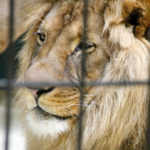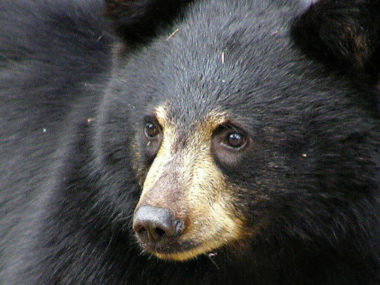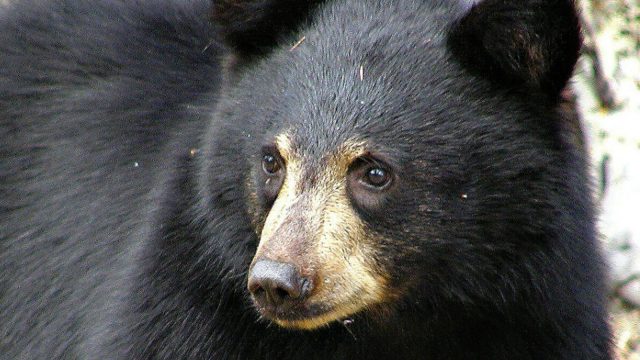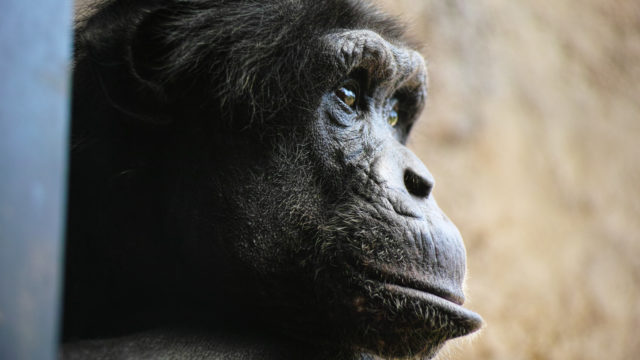
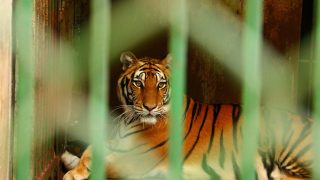

Captive Animals

More tigers live in cages in this country, than exist in all the wild. They are just some of the millions of wild animals living in captivity across the United States. Some are in aquariums, circuses, theme parks and zoos, others live caged at private homes. But few federal laws protect these animals, who may be forced to perform or kept confined in small cages with little to keep their minds occupied and bodies well.
State laws vary considerably, with some states banning the ownership of wild and exotic animals while others have virtually no regulation whatsoever. Captive animals need better laws, and better enforcement of those laws.
Wild Animals Should Not Be Kept In Captivity
Private Possession: Many wild animals may be kept captive in private homes as pets. It’s said that Texas has the world’s second-largest tiger population, due to private citizens’ propensity for keeping these big cats as pets. There is no wild animal census in the United States, and many states have lax oversight, so any estimates about the population of wild animals in captivity is at best an educated guess.
We do know that common animals kept as pets include lions, tigers, cougars, ocelots, servals, wolves, bears, alligators, snakes and nonhuman primates like chimpanzees. These are wild animals, who are dangerous by nature and cannot be domesticated. A largely unregulated trend is the hybrid breeding of wild cats with house cats, with predictably disastrous consequences.
It is expensive and difficult to keep wild animals in captivity. These animals oftentimes live in inhumane conditions, and pose a serious threat to public safety.
Trading in Wild Animals: Every year, thousands of animals enter the captive wild animal trade. Some of these animals are “surplus” from roadside zoos. Others are captured from their native habitats, or come from backyard breeders or the black market. These wild animals are sold at auctions, pet stores or over the internet.
The trade in wild animals involves tremendous suffering at every stage of the process.
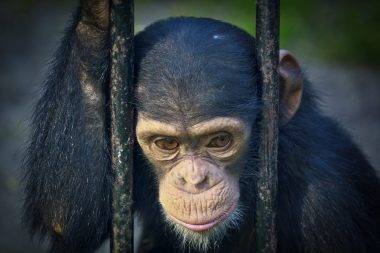
Young chimpanzees on movie sets are “trained” through regular beatings and then discarded around age 8 when they become too large to control.
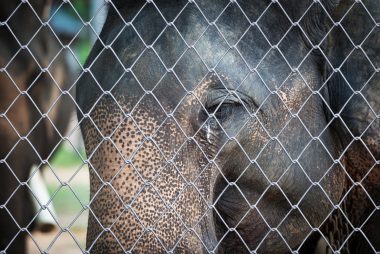
Severe arthritis and foot infections are common in captive elephants due to standing on hard, unnatural surfaces all day without room to roam.
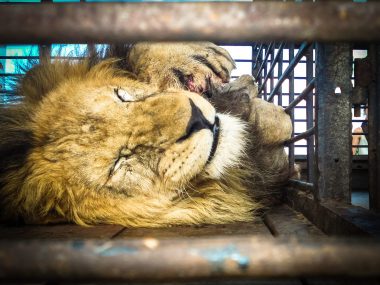
Some roadside zoos declaw tiger and lion cubs – a serious surgical procedure in which a cat’s toes are amputated at the last joint. Declawing is extremely painful and causes permanent disability.
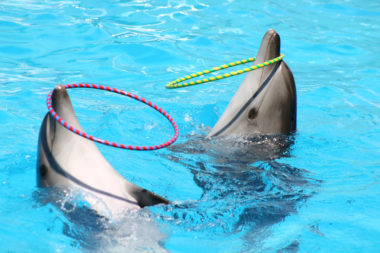
Wild dolphins swim up to 40 miles day with the other members of their pod, while captive dolphins are forced to swim in tiny pools with unfamiliar dolphins day after day.
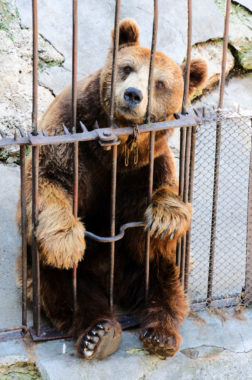
Kept in barren cages rarely larger than 20 by 20 feet, bears in roadside zoos spend their days pacing, sleeping abnormally long periods of time, and bobbing their head – all indications of extreme psychological distress.
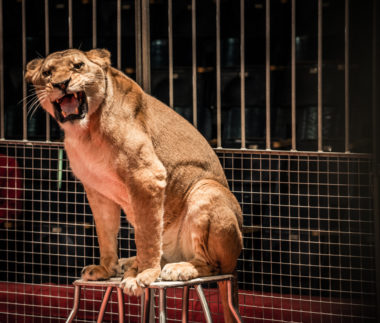
Big cats, such as lions and tigers, used in circuses are forced to live in tiny cages that are transported across the country. Animals are forced to sleep, eat, and defecate in the same small area.
Laws That Protect Captive Wildlife
Few federal laws protect the millions of wild animals who live in captivity in aquariums, circuses, theme parks and zoos in the U.S.
The Animal Welfare Act: The Animal Welfare Act, or AWA, is the primary piece of federal legislation regulating captive wild animals. Zoos and circuses are among those who fall under this act.
The AWA only applies to some captive wild animals. The law, adopted by Congress in 1966, protects so-called “warm-blooded” animals who are bred for commercial sale, used in research, transported commercially or publicly exhibited, like in a zoo or circus. Tigers, lions, elephants, bears and nonhuman primates are all included in this law. But the law excludes protection for birds, rats and mice, farmed animals and “cold-blooded” animals such as reptiles, amphibians and fish.
This is only one of the Act’s limitations. Its protections are minimal as well. The AWA establishes only baseline standards of care for licensing exhibitors. These standards set a low bar and are widely considered to be sub-par in protecting animals. For example, the law does not restrict the display or private ownership of captive wild animals or prohibit the use of controversial bullhooks, whips, electrical shock or other devices commonly used in circuses. For animals in zoos, the AWA sets low requirements as to housing, food and sanitation, and, as is commonly noted, no requirements for mental stimulation of animals other than primates.
Another serious problem is that the chronically-understaffed USDA conducts inspections infrequently. A common criticism is that the inspectors are often inadequately trained to look for sign of problems such as abuse and neglect.
The Convention On International Trade In Endangered Species Of Wild Fauna And Flora (CITES): CITES is an international treaty that regulates the trade of wildlife for nations that are signatories to the treaty. Some 5,800 species of animals are covered by the treaty (along with 30,000 species of plants). CITES does not directly address living conditions for captive animals.
The U.S. became a signatory to CITES in 1975. Today, nearly every country in the world is a member of CITES. The fewer than two dozen non-participants include North Korea, the Federated States of Micronesia, and Turkmenistan.
This treaty is credited with helping foster international cooperation to protect some endangered and vulnerable species. A criticism is that protections are less robust for species that are economically valuable, and that CITES is not as transparent in its decision-making or enforcement as would be ideal.
The Endangered Species Act: The Endangered Species Act, the ESA, is a federal law that protects fish, mammals, birds and plants listed as threatened or endangered in the U.S. and beyond. The ESA outlines procedures for federal agencies to follow regarding listed species, as well as criminal and civil penalties for violations.
In 2014, the Animal Legal Defense Fund successfully brought a lawsuit under the Endangered Species Act against a roadside zoo called the Cricket Hollow Animal Park, that was mistreating protected animals. This was the first time that the ESA has successfully been used to protect captive wild animals. In 2018, the Eighth Circuit issued a unanimous decision in Cricket Hollow’s appeal of that case, that it can be a violation of the Endangered Species Act when captive animals aren’t given proper care.
In several cases, animals held in poor conditions at roadside zoos have been transferred to sanctuaries, after the Animal Legal Defense Fund brought lawsuits under the Endangered Species Act.
State And Local Laws: Strong state laws and even local laws have historically been a useful way to protect exotic and wild animals. There is considerable variation from state to state and among cities and counties, as to how much legal protection is offered to captive wild animals.

Here are some of the major ways that these jurisdictions are protecting wild captive animals under the law:
Restricting Private Parties From Keeping Wild Animals: Some states ban the keeping of wild and exotic animals. Others allow private parties to keep animals like tigers or primates with a permit. Fewer and fewer states are allowing residents to keep captive wild animals without a permit. There were five such states until 2017, when South Carolina passed a law banning wild and exotic animals to be kept as pets. (This law does not affect zoos or circuses.)
In states without tight enough regulation, local jurisdictions oftentimes adopt ordinances that ban or restrict the display of captive wild animals. Local laws are often most effective in governing the private possession of exotic animals.
Models For Improvement And What You Can Do To Help
With increased awareness about the cruelty involved with keeping wild animals in captivity, more and more jurisdictions are enacting legal protections. These laws help the animals and also people, since wild animals in captivity present a serious public safety risk.
The state and local laws protecting wild animals in captivity are spreading. We have good models of captive wild animal protection laws outside of this country as well.
The United Kingdom, for example, has announced a plan to phase out all circuses featuring wild animal performances by 2020. There are dozens of other countries around the world with similar prohibitions, including Austria, Greece, Israel, Mexico, Peru and Singapore. India bans the keeping of elephants in circuses and zoos.
Your voice is needed, so that captive wild animals in the United States, and elsewhere, are better protected.
- Visit animal sanctuaries instead of zoos, marine parks or circuses. Boycott businesses that profit from cruelty to animals.
- Help inform others by writing letters to your local newspapers and posting to social media.
- Tell lawmakers you support animal-friendly legislation and local bans on using animals in entertainment.
Say No to Roadside Zoos
Bears, lions, and other animals languish in roadside zoos across the country. Animals live in cruel conditions, confined to small cages without the enrichment they need to lead full, happy lives. Protect animals by boycotting roadside zoos.
Related Cases
-
Urging FWS Not to Rescind Regulatory Definition of ‘Harm’ Under the Endangered Species Act
Submitted comments against proposed rule on May 19, 2025
-
Challenging the USDA License Renewal of Yellowstone Bear World for Violating the Animal Welfare Act
Animal Legal Defense Fund v. USDA
-
Urging USDA to Revoke AWA Exhibitor License from Jason Clay (2024)
Complaint to USDA submitted on February 27, 2024
Looking for case and legal resources? View Resources
See MoreRelated News
-
Lawsuit to Proceed Against USDA for Issuing Animal Welfare Act License to Yellowstone Bear World
The complaint argues the wildlife park has violated the Animal Welfare Act on numerous occasions, including separating cubs prematurely from their mothersSeptember 19, 2025 News -
Washington Governor Signs Animal Protection Bills into Law
The four laws will offer better protections for companion animals and keep wild animals from being exploited for entertainment in the stateMay 16, 2025 News -
Captive Primate Safety Act Reintroduced in the U.S. House to Protect Nonhuman Primates
Bill will prohibit the type of private possession of nonhuman primates portrayed in the HBO Max docuseries “Chimp Crazy”May 6, 2025 Press Release
